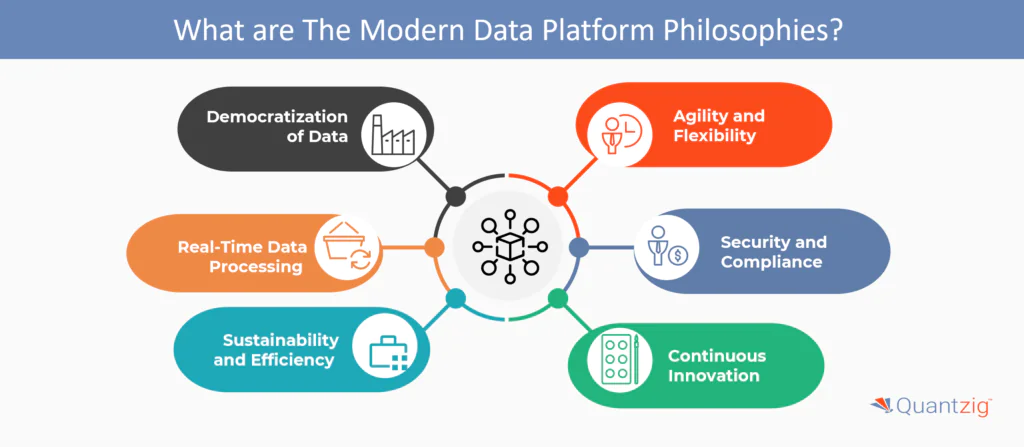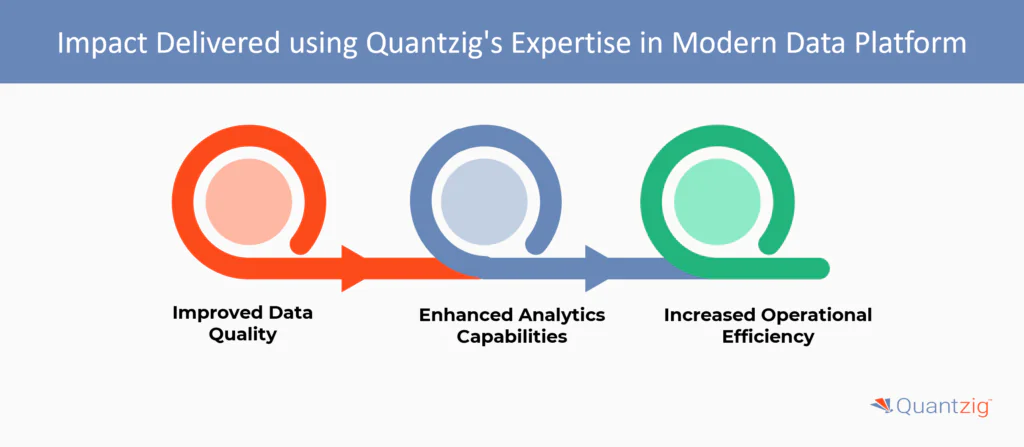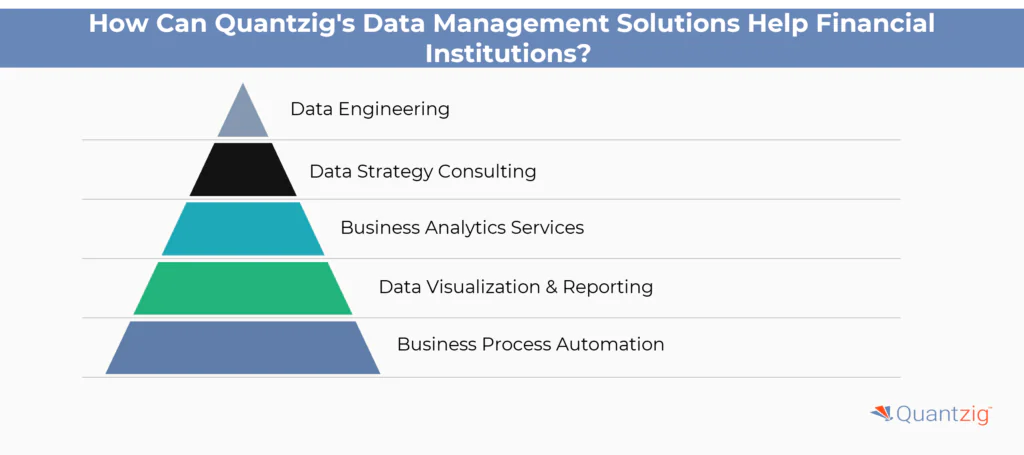Written By: Sudeshna Ghosh
Table of Contents
Key Takeaways
- Modern data platforms are designed to integrate diverse data sources, handle large volumes of data, and scale computing resources automatically to ensure efficient data processing and analysis.
- The rapid advancements in technology, regulatory demands, and market competition have transformed the data landscape in B2B industries. Institutions must modernize their data infrastructure and tools to maintain performance and competitiveness, meeting sophisticated regulatory expectations and countering fintech innovations.
- Modern data platforms offer flexible and user-friendly interfaces, enabling a wide range of stakeholders to interact with and leverage the platform’s capabilities. This democratization of data empowers decision-makers to access and analyze data without technical barriers.
- Quantzig offers comprehensive modern data management solutions, including data engineering, strategy consulting, business analytics, data visualization, and process automation.
Introduction to Modern Data Platform
A modern data platform is a comprehensive suite of cloud-native software solutions that facilitates the efficient collection, cleansing, transformation, and analysis of an organization’s data. This platform is designed to enhance decision-making capabilities by leveraging the scalability, flexibility, and real-time processing capabilities of cloud-native technologies.
Today’s data pipelines have grown increasingly complex and vital for data analytics and data-driven decision-making. A modern data platform fosters trust in this data by ingesting, storing, processing, and transforming it in a manner that guarantees accurate and timely information, minimizes data silos, enables self-service, and enhances data quality. This blog post delves into the concept of a modern data platform, its key philosophies, and the various layers that make up this comprehensive data infrastructure.
Book a demo to experience the meaningful insights we derive from data through our analytical tools and platform capabilities. Schedule a demo today!
Request a Free DemoQuantzig’s Expertise in Data Management Framework for a US-Based Financial Institution
| Category | Details |
|---|---|
| Client Details | A leading financial institution based in the USA with annual revenue of $10bn+. |
| Challenges Faced by The Client | A leading financial institution based in the USA, faced significant challenges in managing its vast and complex data infrastructure. The company struggled with data silos, inconsistent data quality, and inadequate data analytics capabilities. |
| Solutions Offered by Quantzig | Quantzig’s data management solutions helped the Financial Institution overcome these challenges by Data Engineering, Data Strategy Consulting, and Business Analytics Services. |
| Impact Delivered | Improved Data Quality Enhanced Analytics Capabilities Increased Operational Efficiency |
Client Details
A leading financial institution based in the USA with annual revenue of $10bn+.
Challenges in Data Management Faced by the Client
A leading financial institution based in the USA faced significant challenges in managing its vast and complex data infrastructure. The company struggled with data silos, inconsistent data quality, and inadequate data analytics capabilities, hindering its ability to make informed business decisions. This led to inefficiencies in operations, delayed decision-making, and a lack of visibility into key performance indicators.
Data Management Solutions Offered by Quantzig for the Client
Quantzig’s data management solutions helped the client overcome these challenges by:
- Data Engineering: Quantzig streamlined the company’s data infrastructure, integrating disparate systems and ensuring seamless data flow.
- Data Strategy Consulting: Quantzig developed a tailored analytics roadmap, identifying process gaps and introducing plug-and-play business acceleration modules.
- Business Analytics Services: Our team analyzed the company’s data to identify areas of improvement, enhancing performance across the value chain.
Impact Delivered using Quantzig’s Expertise
Quantzig’s data management solutions delivered significant benefits to the client:
- Improved Data Quality: Consistent data quality ensured accurate decision-making and reduced errors.
- Enhanced Analytics Capabilities: Quantzig’s analytics services enabled the company to make data-driven decisions, driving business growth and efficiency.
- Increased Operational Efficiency: Streamlined processes and automated tasks reduced manual intervention, freeing up resources for strategic initiatives.
By partnering with Quantzig, the client was able to transform its data management capabilities, driving business growth, improving operational efficiency, and enhancing decision-making capabilities.
Also Read: Guide to Advanced Marketing Analytics Solutions and Its Business Benefits
Get started with your complimentary trial today and delve into our platform without any obligations. Explore our wide range of customized, consumption driven analytical solutions services built across the analytical maturity levels.
Start your Free Trial TodayWhat is a Modern Data Platform?
A modern data platform is a collection of tools and technologies that manage an organization’s full data lifecycle, from data ingestion and storage to processing and analysis. It integrates various components to provide a unified view of an organization’s data, facilitating real-time processing, advanced analytics, and data-driven decision-making. These platforms are designed to be flexible, scalable, and secure, allowing organizations to adapt quickly to changing business needs and technological advancements. Five essential foundation layers make up a modern data platform, also called a modern data stack: data storage and processing, data ingestion, data transformation, business intelligence (BI), analytics, and data observability.
The following two guiding concepts apply to contemporary data platforms:
- Availability: Since storage and computation are kept apart in data lakes and warehouses, data is easily accessible. By dividing these functions, a lot of data can be stored for a reasonable price.
- Elasticity: Auto-scalability is made possible by the cloud-based nature of compute functions. For instance, processing can be automatically scaled up for a better customer experience and scaled back down as workload requirements decrease if the majority of data and analytics are consumed at a specific day and time.
Why is Modern Data Platform Important for B2B Businesses?

Over the past few years, the rapid advancements in data and technology have led to heightened regulatory expectations and intensified market competition. The emergence of cutting-edge technologies such as open application programming interfaces (APIs), artificial intelligence (AI), cloud computing, machine learning (ML), and others has significantly transformed the data supply chains of financial institutions. In response, data and technology leaders are compelled to undertake comprehensive modernization initiatives, encompassing the overhaul of tools and infrastructure to ensure optimal performance and competitiveness in this evolving landscape.
As regulators become increasingly sophisticated, and driven by enhanced data literacy and capabilities, they are now demanding more granular, traceable, and frequently collected data in an organized manner. The heightened market competition has led financial institutions to innovate and invest in their data assets to remain competitive. To counter the emergence of fintech entrants, institutions are transforming their traditional business models and value chains by leveraging modern platforms that amplify their data capabilities.
What are The Modern Data Platform Philosophies?

Modern data platforms are designed to manage and process large volumes of data efficiently. These platforms are built on several key philosophies that guide their development and operation. Here are six essential philosophies that underlie modern data platforms:
1. Democratization of Data
The democratization of data philosophy emphasizes making data accessible to everyone within an organization. This approach eliminates technical barriers, allowing decision-makers to participate in data-driven decision-making. User-friendly tools and interfaces empower all stakeholders to engage with data, fostering a culture of data-driven decision-making.
2. Agility and Flexibility
Agility and flexibility are critical components of these platforms. These platforms must be able to adapt quickly to changing business needs and technologies. This involves integrating new data sources, scaling in response to fluctuating demands, and updating with minimal disruption. This flexibility ensures that data platforms remain responsive to evolving business requirements.
3. Real-Time Data Processing
Real-time data processing is a fundamental philosophy of modern data platforms. These platforms must be able to ingest, process, and analyze data as it is captured. This enables businesses to gain immediate insights and respond quickly to changing market conditions, customer behavior, and internal alerts.
4. Security and Compliance
Security and compliance are essential considerations in these platforms. These platforms must ensure data is secure, transported and stored properly. This includes adhering to international data regulations and implementing robust security measures to prevent data breaches.
5. Sustainability and Efficiency
Sustainability and efficiency are critical aspects of modern data platforms. These platforms must optimize energy use and resource efficiency to reduce their environmental impact. This includes leveraging cloud computing, data virtualization, and other technologies that minimize the carbon footprint of data management.
6. Continuous Innovation
Continuous innovation is a key philosophy of these platforms. These platforms must incorporate leading technologies, such as machine learning, AI, and blockchain, to stay ahead of the curve. This involves continuous development and integration of new features and tools to support evolving business needs.
These six philosophies form the foundation of modern data platforms. By embracing these principles, organizations can build data platforms that are agile, secure, efficient, and innovative. This enables businesses to harness the full potential of their data, drive better decision-making, and stay competitive in a rapidly changing digital landscape.
Roles of Business Intelligence and Analytics in Modern Data Management
Business intelligence and analytics are essential capabilities of a modern data platform. These layers provide advanced tools for data scientists and analysts to use complex analyses, predictive modeling, and machine learning to turn raw data into actionable insights. Modern data platforms support various analytics use cases, including data visualization, reporting, and predictive modeling.
Data observability is a critical aspect of modern data platforms. It involves monitoring and tracking data flows, processing, and transformations to ensure data quality, integrity, and reliability. Data observability tools provide real-time visibility into data pipelines, enabling organizations to detect and address issues quickly.
What are the Other Modern Data Platform Layers?
In addition to data storage and processing, business intelligence and analytics, and data observability, modern data platforms often include other key layers:
- Data Ingestion: This layer handles the collection and ingestion of data from various sources, including cloud applications, social media, IoT devices, and on-premises systems.
- Data Transformation and Modeling: This layer transforms and models data to prepare it for analysis and visualization.
- Data Governance and Compliance: This layer ensures that data is managed and governed according to organizational policies and regulatory requirements.
- Data Orchestration: This layer automates data workflows and pipelines to improve data availability and quality.
How Can Quantzig’s Data Management Solutions Help B2B Businesses?
Quantzig’s comprehensive data management solutions empower organizations to harness the full potential of their data. Their portfolio includes a range of services designed to streamline data infrastructure, enhance accessibility, and ensure data integrity. Key offerings include:
- Data Engineering: Leveraging state-of-the-art industry frameworks, Quantzig simplifies data stacks, optimizing data flow and ensuring data integrity.
- Data Strategy Consulting: Quantzig crafts tailored analytics roadmaps, identifies process gaps, and introduces plug-and-play business acceleration modules to drive sustainable growth and informed decision-making.
- Business Analytics Services: Quantzig specializes in identifying solutions to complex business problems, enhancing performance across the entire value chain, and driving informed decisions.
- Data Visualization & Reporting: Intuitive, three-click visualizations simplify decision-making, providing actionable insights and driving efficiency across the organization.
- Business Process Automation: Custom apps streamline and automate business processes, reducing manual intervention and unlocking substantial time and cost savings.
By investing in Quantzig’s data management solutions, organizations can unlock the full potential of their data, drive innovation, and maintain a competitive edge in the market.
Also Read: Marketing Data Management: How to Leverage Your Data
Experience the advantages firsthand by testing a customized complimentary pilot designed to address your specific requirements. Pilot studies are non-committal in nature.
Request a Free PilotConclusion
In conclusion, a modern data platform is a comprehensive data infrastructure that integrates various tools and technologies to manage an organization’s full data lifecycle. By embracing the key philosophies of data democratization, agility, real-time processing, security, sustainability, and continuous innovation, modern data platforms empower organizations to make data-driven decisions and drive business outcomes. By understanding the various layers that make up a modern data platform, organizations can build a robust and effective data infrastructure that supports their strategic goals and competitive edge.






